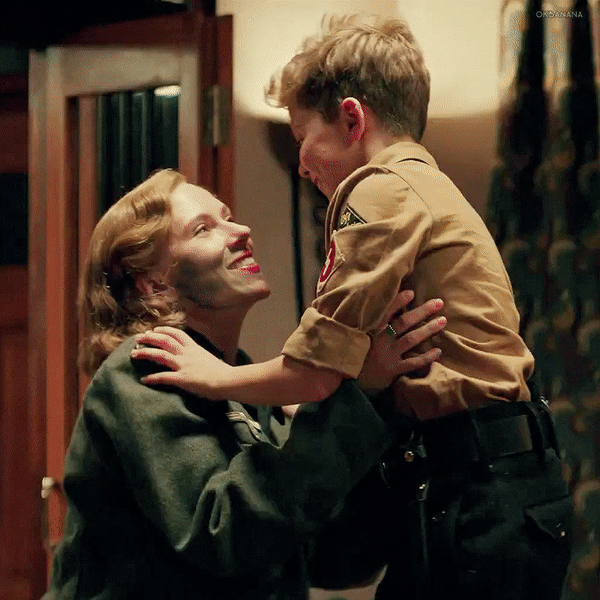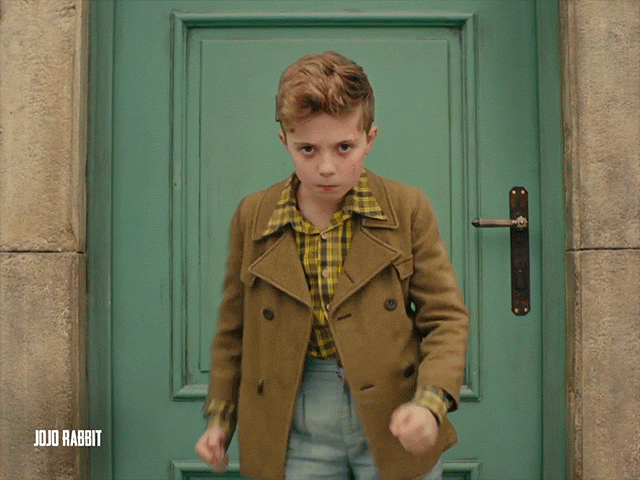Spoilers ahead for Jojo Rabbit. Seriously, stop reading if you don’t want to know how the film ends.
About halfway through Jojo Rabbit, Taika Waititi’s “anti-hate” satire, Jojo (Roman Griffin Davis) and his mom, Rosie (Scarlett Johnason), are walking through a fictional German town. Rosie hops up onto a ledge and starts dancing. The audience primarily sees the action unfold through Jojo’s eyes — so, he is eye level with her feet, and we just watch her feet as she dances.
For some context, Jojo, a German boy, is deeply taken by Nazism and Hitler, so much that his imaginary friend is a child’s imagination of Hitler (played by a magnificent Taika Waititi). Rosie is frustrated with her son’s indoctrination into hate, but tries, as best she can, to undo the damage. These light moments are her trying her best.
Dancing is freedom, Rosie tells her son. When the war is over, she plans to dance.
Consciously or not, Waititi, who is a Māori Jew, is picking up on a deeply Jewish idea: dancing in celebration of freedom. In the story of Exodus, we read: “Then Miriam the prophetess, Aaron’s sister, took a timbrel in her hand, and all the women went out after her in dance with timbrels.” The Israelites cross the Red Sea, witness a miracle, escape Egypt to freedom, and what does Miriam do? She takes her timbrel and dances.
In the now-classic “Miriam’s Song” by Debbie Friedman (an absolute banger), it begins, “And the women dancing with their timbrels / Followed Miriam as she sang her song / Sing a song to the One whom we’ve exalted / Miriam and the women danced and danced the whole night long.” They danced in praise of God, but more importantly, in freedom.
In another scene from the film, Jojo and Rosie are eating dinner, and Jojo is frustrated with his mom for hiding a Jewish girl (Elsa, played by Thomasin McKenzie), but can’t let on that he knows about it. Trying to coax him out of his frustration, Rosie imitates her husband (who is missing) and starts dancing. Eventually, she places Jojo on a chair so they’re eye level, and they dance together. Dancing, for Rosie, is a way of maintaining her individuality, her joy — her freedom.

Rosie, who we later learn is working with the resistance, is executed. Jojo encounters her dead body hanging in the town square, and once again, is at eye level with his mother’s feet as he breaks down into sobs, hugging her legs. The director of photography, Mihai Malaimare, explains it was a conscious choice to focus in on her shoes throughout the film. “So, with the camera we always tried to make sure the audience was aware of Rosie’s shoes. For example, you really notice them when she’s dancing by the river in that light moment so that later we don’t need to show any more.” The scene of a dead Rosie is the closest the film gets to addressing any atrocities that took place during the Holocaust — besides a mention of Elsa’s parents being sent away on a train — and Jojo’s grief is intense.
Yet, the grief does not overshadow the light and humorous tone of the film. In the last scene, Jojo leads Elsa outside after the Allies have won the war. Frightened at first, she steps out and sees an army truck go by waving an American flag. She’s free, she realizes. The Germans have been defeated. The camera zooms in on Elsa, who starts wiggling her shoulders. Back to Jojo, who is doing the same thing. Ultimately, they both break out into full-on dancing, to a German version of David Bowie’s “Heroes” (“Helden”). As one blogger tweeted after watching the film: “Life’s fragile, life’s beautiful, we all need to keep dancing.”

Dancing: It’s joyous. It’s freedom. And yes, it’s very Jewish.
Back to the bible, when Jephtah returns triumphant from battle in Judges 11:34, we are told, “there was his daughter coming out to meet him, with timbrel and dance!” Similarly, when David beats Goliath, “the women of all the towns of Israel came out singing and dancing” to greet him and King Saul (I Samuel 18). Dancing is a celebration of victory throughout the bible — it’s a Jewish way of saying: We did it. We’re free. We defeated them.
“As long as there’s someone alive, they lose,” Rosie tells Elsa at one point. This is a fundamentally Jewish sentiment of resistance: “We will outlive them.” And sometimes, that very resistance leads to dance.
In 1939, as Jewniverse explains, a group of Hasidic Jews from the Polish city of Lublin were backed up against barbed wire and ordered to sing to their own execution. “One of the men began: Lomir zich iberbetn, iberbetn, iberbetn – ‘Let us reconcile…’ But nobody joined him. Then he improvised: Mir veln zey iberlebn, iberlebn, iberlebn – ‘We will outlive them.’ An eyewitness at the scene reported: ‘Instantly the song took hold among the entire people, until it catapulted [them] into a stormy and feverish dance.’ The commander at first laughed, historian Moshe Prager writes, but then ‘he realized they weren’t accommodating him; they were defeating him. He ordered them to stop.’ But they continued. Even when the SS troops charged at them, swinging whips and clubs.”
In the face of terror, of imminent death, they proclaimed we will outlive them. They danced.
Header Image: Scarlett Johansson and Roman Griffin Davis in the film JOJO RABBIT. Photo by Larry Horricks. © 2019 Twentieth Century Fox Film Corporation.



